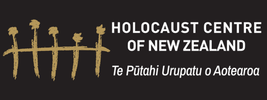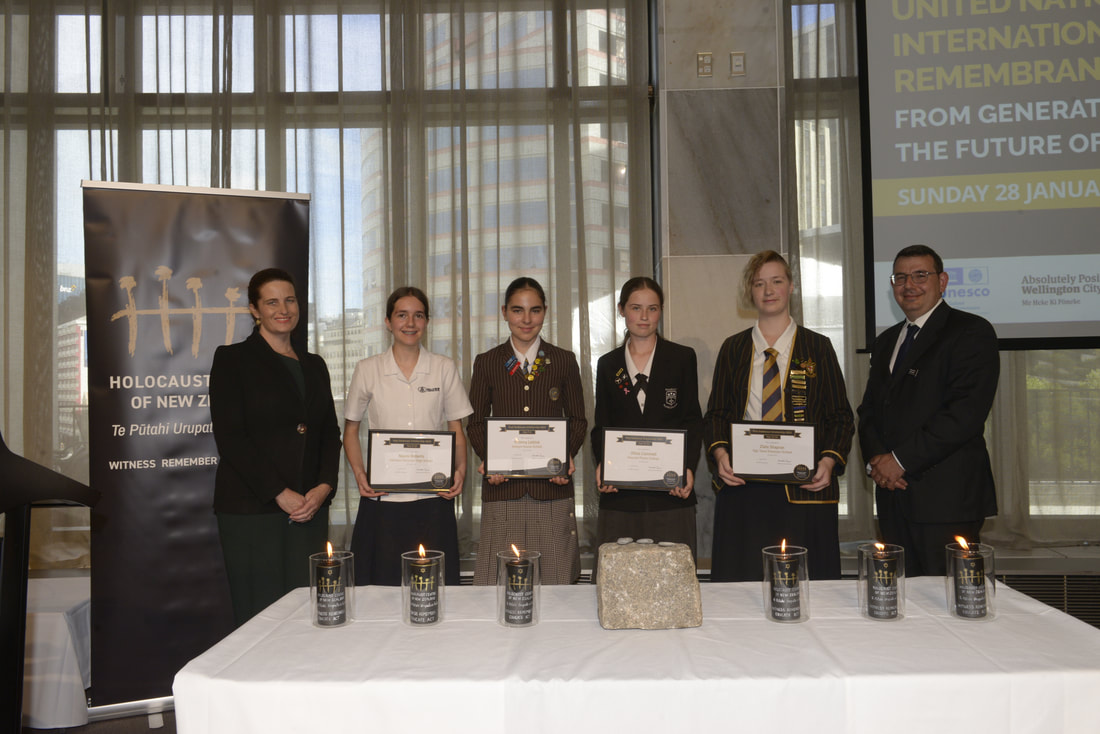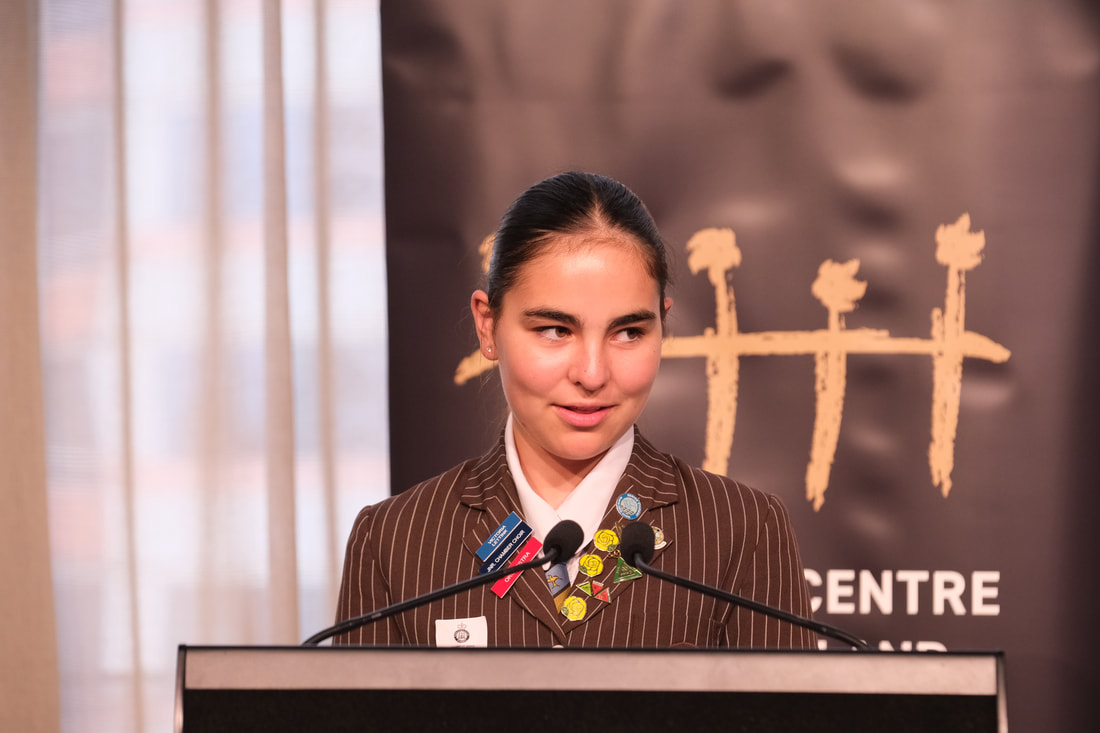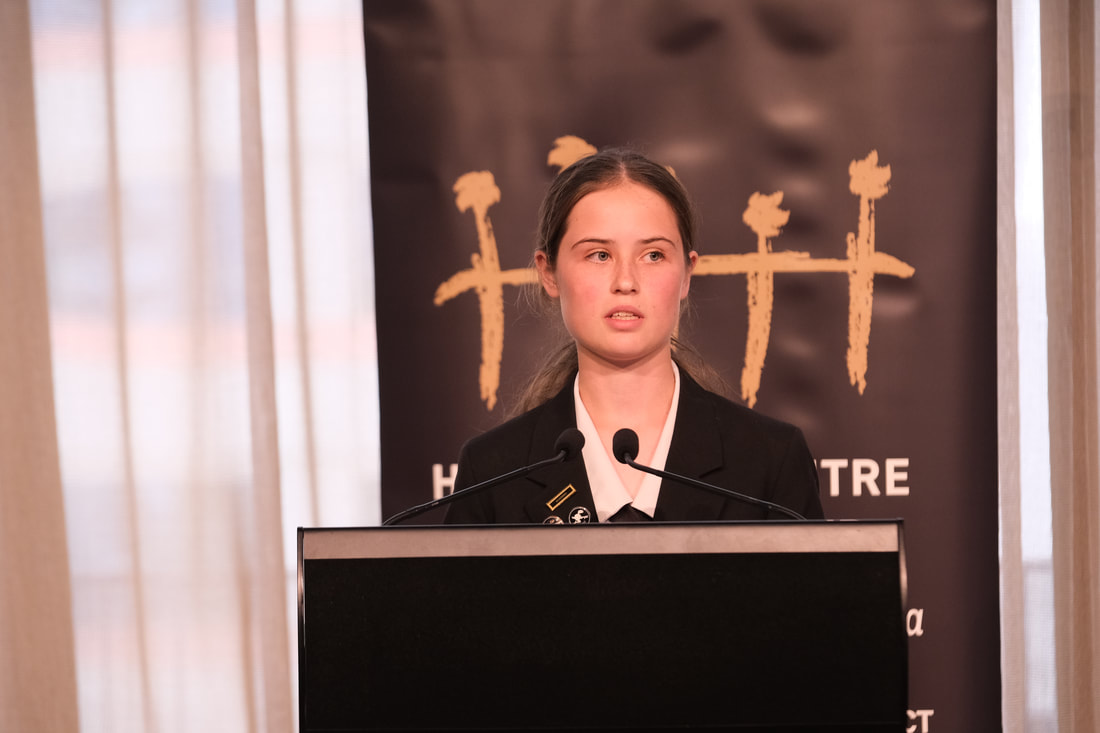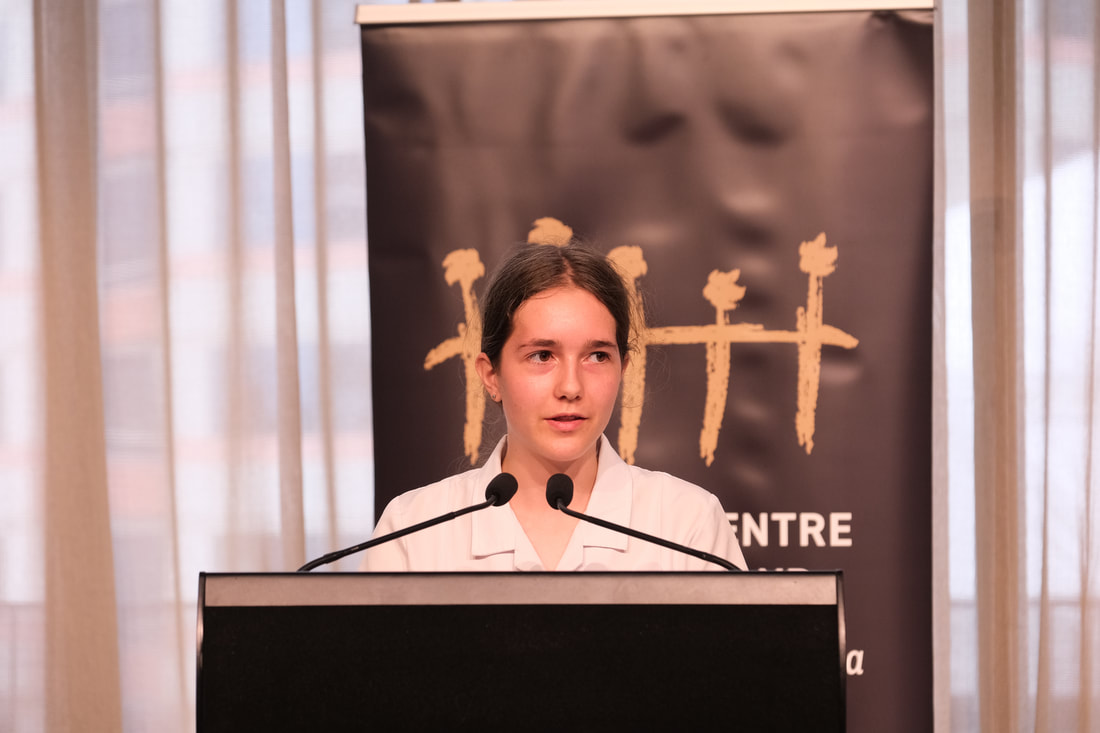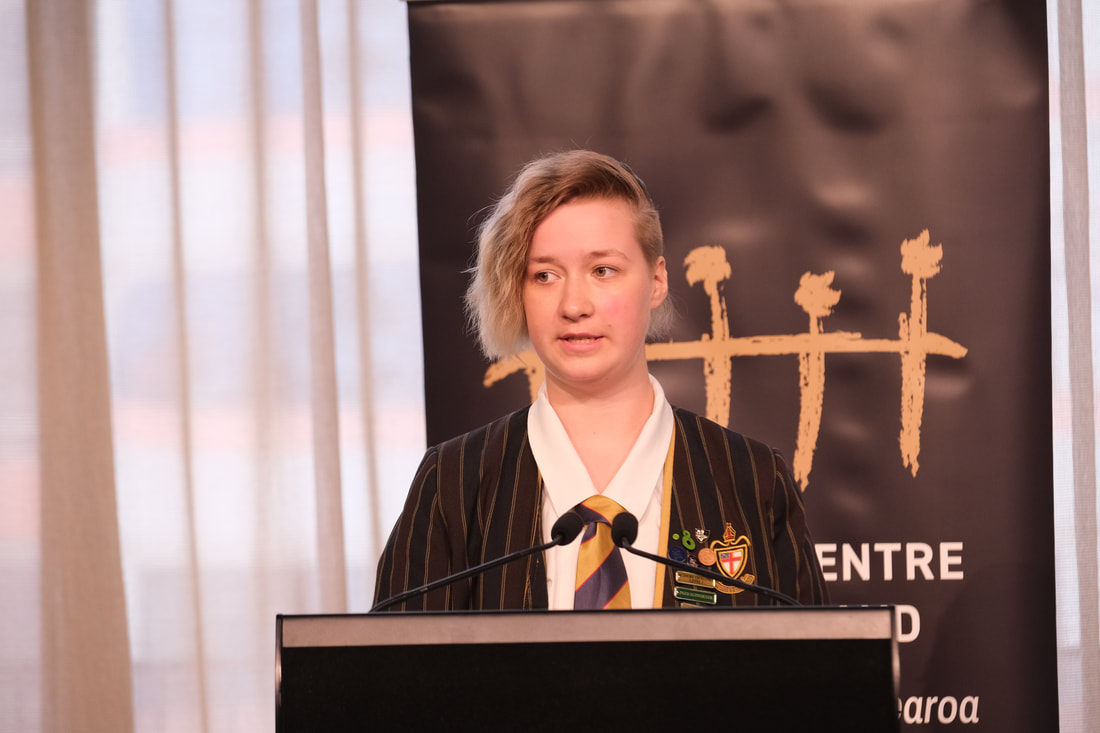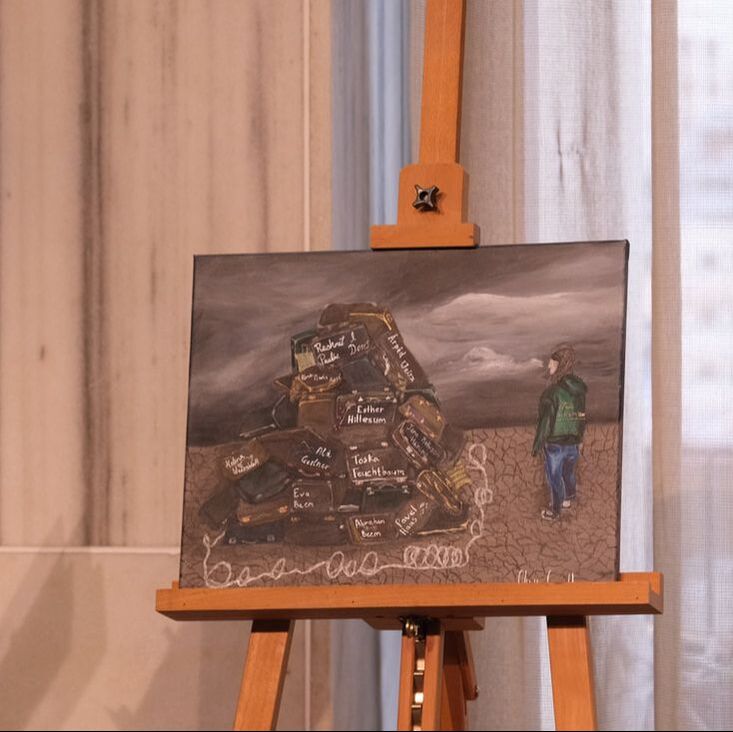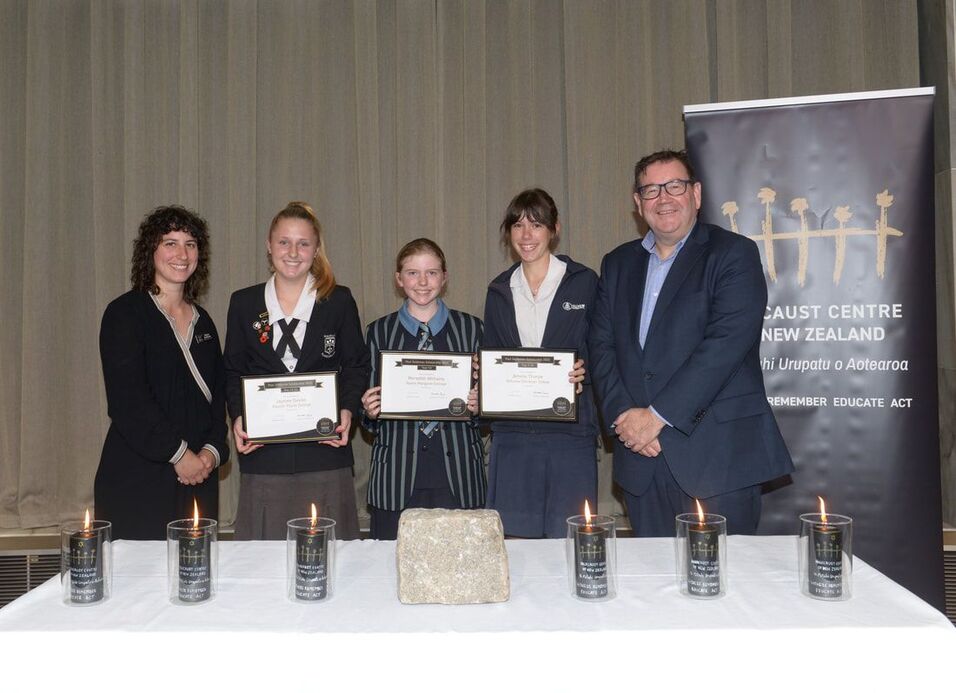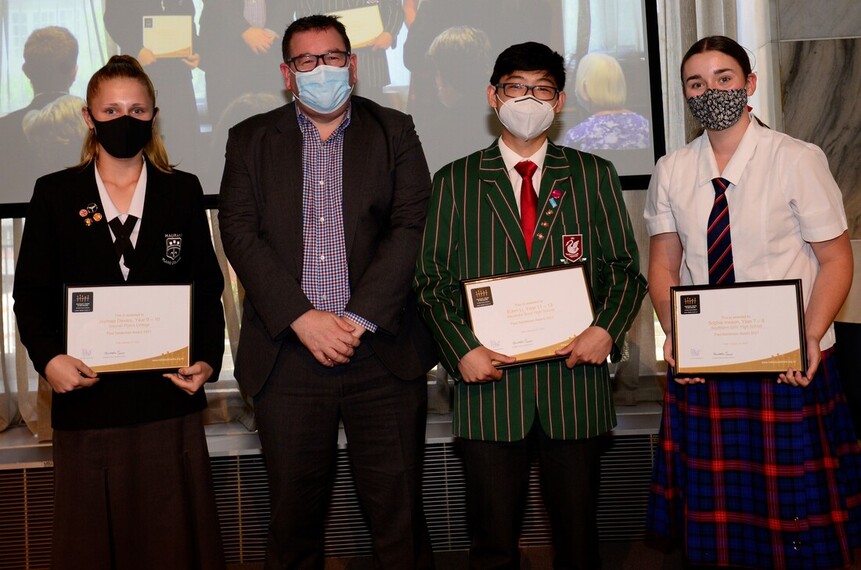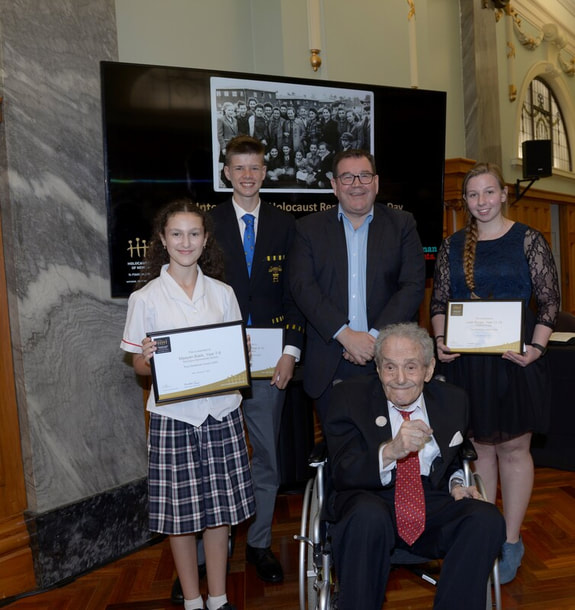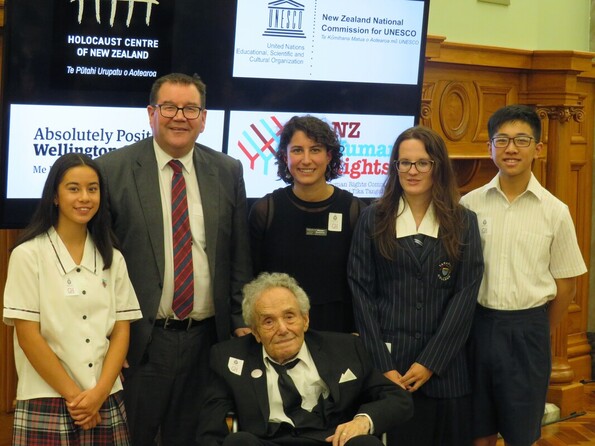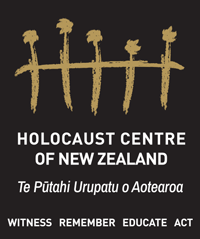Paul Seideman Scholarship for Yrs 7-13
2024 SCHOLARSHIP ROUND NOW OPEN!
BACKGROUND
Holocaust survivor Paul Seideman was a great supporter of Holocaust education and remembrance in Aotearoa New Zealand.
As a young Czech Jew, Paul managed to survive the Lodz Ghetto, several concentration and labour camps, including Auschwitz, and a death march, during World War ll. He was liberated at Dachau, aged 17. After liberation, Paul emigrated to Australia, and then New Zealand. Sadly Paul's mother and father died in the Lodz Ghetto, in 1941. and 1942 respectively.
To commemorate the 70th anniversary of the liberation of Auschwitz-Birkenau by the Soviet Army on 27 January 1945, and to encourage students in Aotearoa New Zealand to engage in Holocaust studies, Paul funded an annual Holocaust essay competition for secondary students, administered by the Holocaust Centre of New Zealand. This was established in 2014, as a 500-word essay on “The Holocaust and its lessons for New Zealand”, and inaugurally awarded on 27 January 2015 at the UN International Holocaust Remembrance Day commemoration at Parliament.
Originally for year 10 and 11 students, the Paul Seideman Holocaust Essay Competition grew into the Paul Seideman Annual Composition Prize, with students from Years 7 to 13 submitting entries in a variety of formats to answer the questions posed, awarded in three categories - Years 7-8, Years 9-10, and Years 11-13.
HCNZ is honoured to carry on Paul's legacy and continues to administer this competition, which annually engages hundreds of students across the nation in Holocaust education, and has now become the Paul Seideman Scholarship.
Format & Entry Requirements:
Entries may be in the form of a poem, a piece of music or art, video/media clip, an essay, or other digital format.
We highly encourage students to explore ways to enter beyond an essay.
Entries can be submitted via email or post.
Maximum 5 minutes in length video/media clip.
Written essays should be submitted in a PDF format, with the following word limits: - Yr 7-8: 500 words maximum - Yr 9-10: 750 words maximum - Yr 11-13: 1000 words maximum.
Entries may be in the form of a poem, a piece of music or art, video/media clip, an essay, or other digital format.
We highly encourage students to explore ways to enter beyond an essay.
Entries can be submitted via email or post.
Maximum 5 minutes in length video/media clip.
Written essays should be submitted in a PDF format, with the following word limits: - Yr 7-8: 500 words maximum - Yr 9-10: 750 words maximum - Yr 11-13: 1000 words maximum.
Entries must include:
Name of student, current year, name of the school, contact phone number, email, and teacher’s name.
Winners will present their entries and receive their prize at the International Holocaust Remembrance Day function in Wellington on 27 January 2025*.
Prizes will be awarded for three categories: Years 7 - 8; Years 9 - 10; Years 11 - 13.
The prize includes:
Name of student, current year, name of the school, contact phone number, email, and teacher’s name.
Winners will present their entries and receive their prize at the International Holocaust Remembrance Day function in Wellington on 27 January 2025*.
Prizes will be awarded for three categories: Years 7 - 8; Years 9 - 10; Years 11 - 13.
The prize includes:
- Return flights to Wellington for the student and one guardian.
- Overnight hotel accommodation in Wellington (out-of-town winners only)
- $500 scholarship. In the event of there being tied prize winners, the prize money will be split between the winners.
- Framed certificate
- Overnight hotel accommodation in Wellington (out-of-town winners only)
- $500 scholarship. In the event of there being tied prize winners, the prize money will be split between the winners.
- Framed certificate
Deadline:
All entries are due by Monday 30 September, 4 pm. Due to the number of entries received, only the winners will be notified on Monday 14 October.
All artwork entries will be returned to entrants at the end of the competition.
All entries are due by Monday 30 September, 4 pm. Due to the number of entries received, only the winners will be notified on Monday 14 October.
All artwork entries will be returned to entrants at the end of the competition.
Competition Topic
Years 7—13
Years 7—13
“Get it all on record now - get the films, get the witnesses - because somewhere down the road of history some
b****** will get up and say that this never happened."
Dwight D. Eisenhower, Allied Commander and former President of the United States.
It has been 80 years since the liberation of Auschwitz and the end of arguably the worst war in human history. Since the end of World War II, the ways in which we commemorate the Holocaust have evolved. As we quickly approach a point where there will be no living survivors of the Holocaust, the ways in which we commemorate the Holocaust will change. Evaluate how Holocaust commemoration has changed over time and how you envision commemorating the Holocaust will be like in the next 80 years. Your entry should show how you view Holocaust commemoration as well as the importance of such events.
Your entry can be in the form of an essay, movie, artwork, poem, or medium of your choice so long as it speaks to the topic posed.
Your entry can be in the form of an essay, movie, artwork, poem, or medium of your choice so long as it speaks to the topic posed.
Entries and all queries should be sent to:
Email: [email protected]
Postal: Kristopher Clancy
Education Director
Holocaust Centre of New Zealand
80 Webb Street, Te Aro
Wellington 6011
*All entrants must be available for the International Holocaust Remembrance Day on 27 January 2025 and by entering this competition students agree to the inclusion of their work and photos in HCNZ publications and online platforms.
Email: [email protected]
Postal: Kristopher Clancy
Education Director
Holocaust Centre of New Zealand
80 Webb Street, Te Aro
Wellington 6011
*All entrants must be available for the International Holocaust Remembrance Day on 27 January 2025 and by entering this competition students agree to the inclusion of their work and photos in HCNZ publications and online platforms.
2023 Winners
L to R: The Honourable Nicola Willis, Deputy Leader National Party, Naomi Roberts, Victoria Lettink, Olivia Cammell, Zlata Shapran and Assoc. Prof. Giacomo Lichtner, Deputy Chair, Holocaust Centre of New Zealand. UN International Holocaust Remembrance Day commemoration and prize giving, 28 January 2024. Photography by Woolf
For the first time since we started administering the Paul Seideman Scholarship, the 2023 year saw two winners in the Yr 11 - 13 category, and for the first time one winning entry was a painting. Prize giving was awarded during the UN International Holocaust Remembrance Day event hosted in Parliament by the Hon. Nicola Willis.
Well done Victoria (essay), Naomi (poem), Olivia (painting) and Zlata (poem).
HCNZ administers this annual competition with much appreciation to the late Paul Seideman z"l for his endowment of such a successful initiative.
We would like to thank all the students who submitted an entry, and acknowledge the high standard of research and composition, from around the country, and across mediums; from art to music, poetry, essays, and film.
It is heartening to see the youth of Aotearoa engage with topics from the Holocaust with support from their teachers and parents.
Well done Victoria (essay), Naomi (poem), Olivia (painting) and Zlata (poem).
HCNZ administers this annual competition with much appreciation to the late Paul Seideman z"l for his endowment of such a successful initiative.
We would like to thank all the students who submitted an entry, and acknowledge the high standard of research and composition, from around the country, and across mediums; from art to music, poetry, essays, and film.
It is heartening to see the youth of Aotearoa engage with topics from the Holocaust with support from their teachers and parents.
The topic for 2023 was “Whoever listens to a witness, becomes a witness." - Elie Wiesel
Nearly 80 years after the end of World War II and the Holocaust, we are quickly reaching a point where first-person accounts of the events surrounding this horrific time in history will be gone. With ever-increasing reports of rising antisemitism worldwide and in Aotearoa New Zealand, many question how Holocaust education will change when the last survivors pass.
Examine the way in which the loss of the first-generation survivors will impact Holocaust education. Your entry should show how you view the need for continued Holocaust and antisemitism education as well as the importance of such education in creating a more just society.
Nearly 80 years after the end of World War II and the Holocaust, we are quickly reaching a point where first-person accounts of the events surrounding this horrific time in history will be gone. With ever-increasing reports of rising antisemitism worldwide and in Aotearoa New Zealand, many question how Holocaust education will change when the last survivors pass.
Examine the way in which the loss of the first-generation survivors will impact Holocaust education. Your entry should show how you view the need for continued Holocaust and antisemitism education as well as the importance of such education in creating a more just society.
2022 Winners |
L to R: Miriam Bookman, Deputy Chair, Holocaust Centre of New Zealand, Jaymee Davies, Meredith Williams, Amelie Thorpe, and the Honourable Minister Grant Robertson . UN International Holocaust Remembrance Day, 27 January 2023. Photography by Woolf Year 11 - 13: Jaymee Davies, Yr 11, Hauraki Plains College, Ngatea
Year 9 - 10 : Amelie Thorpe, Yr 10, Hillview Christian School, Christchurch
Year 7 - 8 : Meredith Williams, Yr 8, Queen Margaret College, Wellington
|
2021 Winners
|
L to R: Jaymee Davies, Hon Grant Robertson Deputy Prime Minister, Eden Li and Sophie Ineson.
27 January 2022, prize-giving at Parliament, on UN International Holocaust Remembrance Day. Photography by Woolf Year 11 - 13: Eden Li, Yr 12, Westlake Boys High School, Auckland
Year 9 - 10: Jaymee Davies, Yr 10, from Hauraki Plains College, Ngatea
|
Year 7 & 8: Sophie Ineson, Yr 8, from Southland Girls High School, Invercargill
2020 Winners
|
L to R: Maayan Bialik, Felix Steiner, Hon Grant Robertson, Deputy Prime Minister (host of the Parliamentary reception) Leah Burger, and Holocaust survivor and endower of the competition Paul Seideman. UN International Holocaust Remembrance Day, 27 January 2021.
Credit: Photography by Woolf YEAR 11 - 13: Leah Burger Year 13, Rosehill College, Auckland
YEAR 9 - 10: Felix Steiner Year 10, Rongotai College, Wellington
YEAR 7 - 8: Maayan Bialik Year 7, Remuera Intermediate School, Auckland
|
2019 Winners
|
L to R: Rosetta Tanner, Hon Grant Robertson, Deputy Prime Minister (host of the Parliamentary reception), Miriam Bookman, Deputy Chair of the Holocaust Centre of New Zealand, Sophey Jenkins, Orlando Ye, and Holocaust survivor and endower of the competition Paul Seideman.
UN International Holocaust Remembrance Day, 27 January 2020. Photography by Woolf Year 11 - 13: Sophey Jenkins, Tararua College, Pahiatua
Year 9 - 10: Orlando Ye, Botany Downs Secondary College, Auckland
Year 7 - 8: Rosetta Tanner, Somerville Intermediate School, Auckland
|
